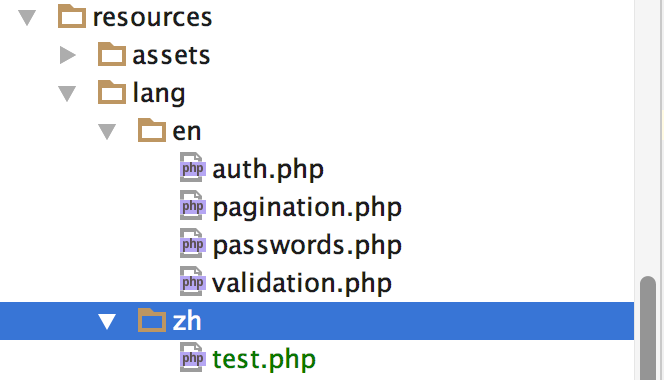1.本地化
Laravel 的本地化功能提供方便的方法来获取多语言的字符串,让你的网站可以简单的支持多语言。
语言包存放在 resources/lang 文件夹的文件里。每一个子目录应该对应一种语言
最初的目录结构,里面包含了验证类的一些提示内容

下面我们添加一个中文的语言文件,以test文件举例

语言包简单地返回键值和字符串数组,例如:
<?php return array(
'first'=>'this is the first test' ,
'second'=>'this is the second test'
);
接下来我们切换语言包,进入config/app.php 配置文件
更改如下:
'locale' => 'zh', //设置使用的语言包
'fallback_locale' => 'en', //设置 "备用语言",它将会在当现有语言没有指定语句时被使用
使用方法:
使用 trans 辅助函数来获取语言字符串,trans 函数的第一个参数接受文件名和键值名称
控制器中测试代码
echo trans('test.first');
echo '<br/>';
//由于我们没有在zh文件夹下创建validation.php文件,所以在备用语言中寻找
echo trans('validation.accepted');
exit;
结果如下:
this is the first test
The :attribute must be accepted.
如果改动config/app.php 配置文件中的 'locale' => 'en',
发现结果发现:
test.first
The :attribute must be accepted.
扩展:
如果需要,你也可以在语言包中(这里可以在test.php文件中)定义占位符,占位符使用 : 开头,
'welcome' => 'Welcome, :name',
接着,传入替代用的第二个参数给 trans 方法:
echo trans('test.welcome', ['name' => 'Archer']);
2.常量的使用
在app/config文件夹下新建一个php文件,这里我们建立constants.php文件,内容如下
<?php
return array(
//成交信息
'FIRST' => '测试常量信息111',
'SECOND' => array('NEXT' => '测试常量信息第二层')
);
使用方法
echo Config::get('constants.FIRST');
echo Config::get('constants.SECOND.NEXT');
或者
echo config(sprintf('constant.%s', 'FIRST'), null);
echo config(sprintf('constant.%s', 'SECOND.NEXT'), null);